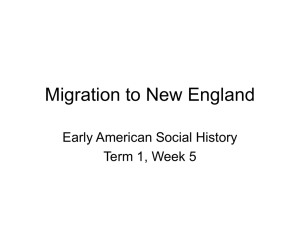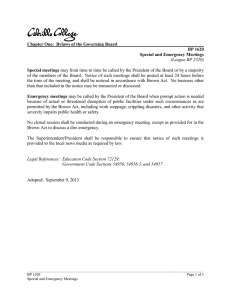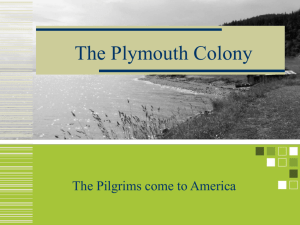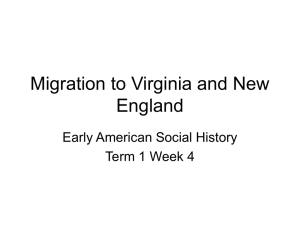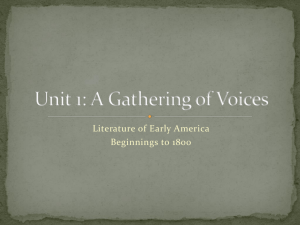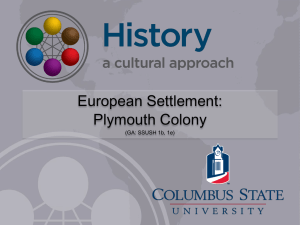Migration to New England Early American Social History Term 1, Week 5
advertisement
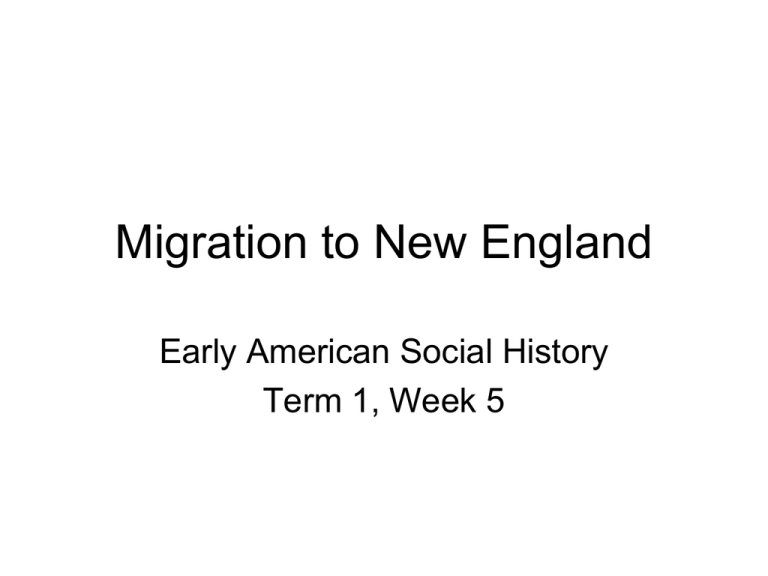
Migration to New England Early American Social History Term 1, Week 5 Competing claims of European powers Various explorations of New England coast from c.1500 Rich prize for first European nation to settle permanently Little regard for native rights Introduction • New England important because of religious origins, tale of spiritual re-birth, attempt to create utopia • New England known to have harsher climate than Va • Marked differences between New England and earlier settlements in Va • 5 main areas of settlement in New England between 1620 and 1638. – – – – – Plymouth 1620 Massachusetts Bay 1630 Connecticut 1634 Rhode Island 1636 New Haven 1638. Pilgrims 1 • 1608 persecuted Eng separatists left Scrooby (Notts) for Holland (Leiden) seeking religious freedoms • 1620 same group fear resumption of Spanish/Dutch war, and think the Dutch too capitalist – seek to voyage to America. • Unable to get own charter, purchase land grant off Va Company (most = merchants, i.e. have money) Pilgrims 2 • Sept 1620, 102 settlers leave Plymouth on Mayflower, Nov 1620 sight Cape Cod, far north of original destination, but still within limits of Va Co. charter. • Move from Cape Cod to settlement they name Plymouth. • Not all settlers = separatists, but all join to sign Mayflower Compact, • Gov William Bradford, good Indian relations with Massasoit, enables settlement to survive, though 50% die in first year. • 3 day feast of thanksgiving celebrated Nov 1621. Mayflower Compact • Having undertaken, for the Glory of God, and advancements of the Christian faith and honor of our King and Country, a voyage to plant the first colony in the Northern parts of Virginia, do by these presents, solemnly and mutually, in the presence of God, and one another, covenant and combine ourselves together into a civil body politic; for our better ordering, and preservation and furtherance of the ends aforesaid; and by virtue hereof to enact, constitute, and frame, such just and equal laws, ordinances, acts, constitutions, and offices, from time to time, as shall be thought most meet and convenient for the general good of the colony; unto which we promise all due submission and obedience. Plymouth Plantation Plymouth Bradford’s Of Plimouth Plantation records experiences of Pilgrims from 1608 to 1647 Puritan Origins • 1630 new settlement led by John Winthrop (b.1588 to wealthy East Anglian family), of 700 non-separating congregationalists. • Most migrants from East Anglia, affected by decline in cloth trade, but also lacked strong deferential traditions, and radical protestant texts came into EA ports from Germany. • Disliked lingering Catholic practices in Anglicanism, eg vestments, Bishops etc. • Belief that separation of church and state was necessary ‘only the Godly should rule the Godly’ • Yet, committed to ideals of the C of E, therefore try to set example of behaviour for others to follow • Image = staid, boring, no fun – but really just trying not to be sinful. Puritans in England • Each congregation independent (hence name Congregationalists), chose own ministers etc. • Refuse to accept authority of bishops or any civil power over religion • Tolerated, rather than accepted, until appointment of William Laud as Abp of Canterbury (1620) – high church, emphasis on hierarchy, increased investigation and persecution of dissenters, e.g. ministers banned from pulpits, arrested etc Getting the charter • Va Co dead by 1624, new charter needed. • Puritan merchants get charter of Massachusetts Bay Company from King 1629 • Only migrants allowed to be shareholders, so charter taken to America – prevents alteration at later date. • 4 ships set out for America in 1630, the Arbella, the Talbot, the Ambrose and the Jewel. Settlers • Most migrants (70%) in family groups; 30% single males, but usually attached to families as servants. • Adults usually in 30s or 40s, brought children with them, had more after arrival. • Life exp v good, 70s when only 50s in Eng, few problems with disease, no major Indian problem (smallpox epidemic) Why go? • Seek religious freedoms – worship without interference • ‘To be as a city on a hill, the eyes of the world shall be upon us’[Winthrop] • Prove that religious utopia possible, and that it would be the best type of society. • Only persecution and econ hardship remaining in Eng – ec motives? Promotional Literature Commonality with Va. Greater use of religious imagery “Thanks be to God, we have plenty of preaching, and diligent catechizing, with strict and careful exercise, and good and commendable orders to bring our people into a Christian conversation with whom we have to do withal. And thus we doubt not but God will be with us, and if God be with us, who can be against us?” (Higginson) Read by ministers – has spiritual authority Great Migration • 1620 - 1642 about 25,000 people migrated to New England in 198 ships, by 1640 total popn = 40,000. [good rate of natural increase] • Migration very low 1642-60, due to Civil War, picks up after 1660. • By 1636 Harvard founded in Cambridge, link to Emmanuel College – 90 New England ministers had been trained there. • Boston became largest town and premier port Conclusions • Unlike Chesapeake, migration to N.Eng not ongoing phenomenon, society more settled stable as a result • Whole communities transplanted across Atlantic, renamed new settlements after English ones eg Boston, Dedham, Springfield, Sudbury etc. • V. diff societal template to Virginia
